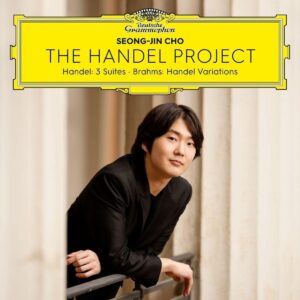If I encounter another CD with the word “project” in its title, I’m going to scream. Besides, pairing Handel suites with Brahms’ Handel Variations is not exactly a new or even an original idea. Still, Seong-Jin Cho’s songful pianism largely enchants.
The F minor Suite Prélude’s dotted rhythms are both pointed and flexible, setting the stage for a briskly lilting Fugue, abounding with imaginatively varied articulation. Cho brings a bubbly lightness to the left-hand lines of the F major Suite Allegro that is playful without being coy. Also note the pianist’s inward delicacy in the E major Allemande. Cho eschews the amplified textures and octave doublings certain pianists favor in the suite’s famous “Harmonious Blacksmith” variations (Alicia de Larrocha, for example); I wish he would have let loose with more virtuoso abandon. As for the Handel/Kempff Minuet, I prefer Cho’s elegant and refined interpretation over Kempff’s own plainer-spoken mono Decca traversal.
Cho’s reading of the Brahms/Handel opening theme (the Aria from the B-flat major Suite HWV 434) is upbeat and impetuous, in contrast to the stately Perahia and Arrau. Throughout the variations proper Cho tends to taper phrases at the ends of sections, while indulging in expressive subito pianos and diminuendos oriented more toward pianistic fancy than architectural design. Yet Cho uncovers plenty of inner voices on repeats, and renders the composer’s thickest textures with impressive transparency: the Fugue especially stands out in this sense, for whatever it lacks in dramatic heft. The pianist’s ever-so-slight blurring of the pedal in Variation 22 imparts an extra degree of shimmer to the music box-like writing. Cho’s pliable phrasing admirably minimizes Variation 13’s pompous potential. However, I miss the firm motoric underpinning others bring to Variation 8’s ostinato pedal point, not to mention Arrau’s surging momentum in the final two variations. DG provides ideal sonics and an insightful booklet interview with the pianist.
































